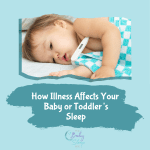
The diagnosis of baby acid reflux appears to be on the rise. We talk to many parents each week and a good number will have babies with reflux. Although it seems to be diagnosed more now, babies having reflux is actually not new and very common. This article will talk about your baby’s spit up, infant reflux, and how it may affect your baby’s sleep.
What is baby acid reflux?
First, what is reflux? The medical name is Gastroesophageal Reflux, and some know it by GERD. All this means is that stomach contents come back up the esophagus. The definition of “reflux” is “a flowing back.” When put that way, it shows you just how common it is. Babies are known to spit up a lot and I’m sure many of us can relate to how cute newborn clothes are, but they are only on your baby for a couple hours at a time and you’re doing laundry daily due to spit up!
And, why do babies spit up?
Your baby spits up or has reflux due to an immature digestive tract. As your baby grows, the tract will mature and less stomach contents will be regurgitated. The ring of muscle where the esophagus meets the stomach is soft in a baby and becomes firmer as your baby grows. Most babies outgrow spitting up and reflux by 12-18 months old.
What are the signs and symptoms of reflux?
The biggest symptom, of course, is spitting up (usually after a feeding, but not always), but if your baby has “silent reflux” he can be uncomfortable without the spit up, too. Your baby may also be fussy during a feeding and some even cry while you’re feeding them. 🙁 You might hear gurgling sounds during or after a feeding. If your baby cries a lot when laid on his back after a feeding, he may be experiencing discomfort from the food traveling back up. If your baby eats smaller, frequent meals, refusing to eat larger bottles compared to other babies his age (within reason), he may be experiencing reflux.
Do you have to worry about your baby’s spit up and reflux?
For most babies, some spit up is normal and it does not bother them too much. Some even call them “happy spitters.” If your baby is having enough wet diapers, is gaining weight appropriately, and otherwise happy and content, your doctor will most likely not prescribe any medication for the reflux. Some babies will feel uncomfortable immediately after spit up or a feeding, but otherwise may be okay, and those babies won’t usually get medication, either.
For more severe cases of reflux, your baby may not eat enough or spit up too much, and can have weight gain issues. Others are simply miserable much of the day and have more frequent night-waking. For these babies, your doctor may prescribe medication, which we have begun to hear more and more about lately. If you are concerned about your baby’s spit up and suspect she may have a more severe case of acid reflux or a more serious condition, please do talk to your baby’s doctor.
How does your baby’s reflux affect sleep?
Babies with reflux typically need to eat smaller, more frequent meals. This avoids their tummy being too full. A full stomach can increase the likelihood that food will come back up. Your doctor will also likely tell you to feed your baby upright and to keep your baby upright after eating, before laying him down on his back.
A baby with reflux will need special sleep strategies too
Here are some tips:
- Consider raising up one side of the crib mattress such that the baby is sleeping with an incline. Of course, you have to be cognizant about a mobile baby rolling too far down to the other end of the crib. You can consider something like the Baby Stay Asleep for your baby to keep her from moving around too much.
- Have appropriate expectations. Can you get your baby with reflux who wakes every hour to sleep 12 hours straight? Maybe, Maybe not. It doesn’t mean you can’t improve your baby’s sleep. I do encourage parents to try using a No-Cry or Limited-Crying Sleep Training Method, because too much crying can aggravate the reflux.
- For severe cases of GERD, I recommend getting the reflux under control prior to helping your baby learn to sleep better. If you’re just starting medication, allow for some time to see if the medication is working. Then, start to teach baby new sleep habits. If you are wondering if baby is uncomfortable because of reflux, then this will likely lead to too much inconsistency and more frustration for all of you.
- If you are sleep training, make sure you move the feeding earlier in the bedtime routine. If you have to hold your baby for an additional 20-30 minutes after a feeding, it increases the likelihood that she will fall asleep being held.
- You may have to night wean your baby LATER than average or other babies her age. Your baby’s health is the #1 priority. Sleep is important for growth and development, too, but making sure your baby is eating enough is top priority.
Final thought on acid reflux and sleep
Although it’s been said that breastfed babies spit up less, both my boys spit up. And I breastfed for their first year. My youngest spit up a TON!! He was, thankfully, a “happy spitter” though and we never had serious reflux issues. We used cloth diapers as burp cloths and rarely picked him up without one on our shoulder. We’d go through many outfits and cloth diapers every day. I have many clients with babies with reflux. Once they have the reflux under control, either by medication or by changing routines, babies with reflux can go on to be good sleepers just like the rest of us.
Sources:
Journal of Human Lactation – http://jhl.sagepub.com/content/25/2/237.citation
The Mayo Clinic – http://www.mayoclinic.com/health/infant-acid-reflux/DS00787








